Brooklyn Review
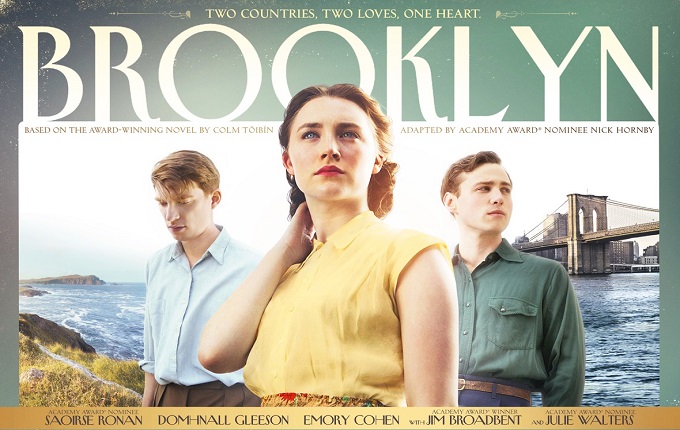
The Plot
In 1950s Ireland and New York, young Eilis Lacey (Saoirse Ronan) has to choose between two men and two countries.
The Good
Saoirse Ronan gives an incredible and likely award winning performance in this beautiful adaptation of Colm Tóibín’s 2009 novel of the same name. The story of Brooklyn is not particularly unique, with Ronan’s Eilis transporting herself from the familiar territory of 1950s Ireland to an entirely new world altogether in Brooklyn New York, struggling with the pain of homesickness as well as the guilt of happiness in her new found life across the pond.
The emotional themes of a homesick immigrant dominates the film and certainly succeeds in leaving audiences in tears as Ronan brings an utterly compelling role to life. Her strength and the maturity that she brings to the role just proves even further that she is without a doubt one of the finest actresses of her generation.
Ronan is aided by a strong supporting cast including Julie Walters, who appears in some of the films lighter moments as Eilis’ sharp tongued boardinghouse owner Mrs. Kehoe, producing instantly memorable dinner scenes. Jim Broadbent, meanwhile brings a heartwarming sense of calm during some of the more heartbreaking scenes as Eilis’ benefactor, Father Flood.
At its center Brooklyn is a love story, particularly held together by both Ronan and Emory Cohen as the Brooklyn side of a trans-Atlantic love triangle . Cohen brings a touch of class and romance to the story which, along with his seamless chemistry with Ronan, makes their story instantly believable.
The Bad
Unfortunately the other side of this love triangle played by Domhnall Gleeson feels more like a third wheel. Gleeson plays Jim Farrell, a romantic complication who appears in the films latter half after a tragedy brings Eilis back home. Feeling very shoehorned in as one of the ways in which Eilis’ life is so easily set up to continue back in Ireland along with a job and her old home. Gleeson’s performance is just too quiet to feel like a true equal to the love Eilis finds in America. While the rest of the temptation of familiarity with her old life is easy to understand, Jim’s addition feels underdeveloped and too quickly added in. Perhaps if he’d had some focus in the films opening, it may have worked better.
The Ugly Truth
Brooklyn is a beautifully shot and wonderfully told tale of what it is to be homesick and the temptation to slip back into familiarity at the risk of losing a more exciting life. Saoirse Ronan brings an incredible performance along with a strong supporting cast. However when the setting returns to Ireland, the final act feels less convincingly emotionally conflicted than it clearly intends to be.
Review by Johnny Ellis
The Hunger Games: Mockingjay Part 2 Review
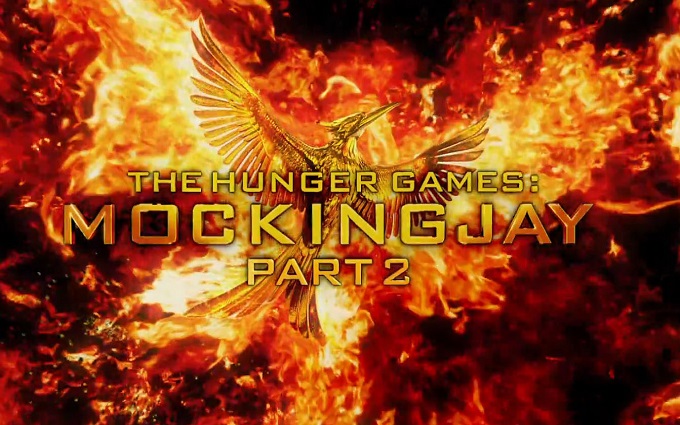 The Plot
The Plot
With Panem at the tipping point of a revolution, Katniss (Jennifer Lawrence) and her army make their final push into the Capitol to deal with President Snow (Donald Sutherland) once and for all.
The Good
Picking up from right where Part 1 left off, with Katniss sporting a badly bruised neck thanks to Peeta (Josh Hutcherson) and his drastically changed views of the girl on fire, Mockingjay Part 2 switches the dialogue heavy scenes from its predecessor and replaces it with action heavy set sequences. As Katniss and co make their way into the Capitol to take down President Snow, director Francis Lawrence takes us through a battle torn landscape overground and underground.
It’s the underground sequence that works best however, as the characters manoeuvre through a labyrinth-like sewer system while being stalked and attacked by creatures not too dissimilar to zombies. The entire sequence plays out with a suspense filled with deafening silences before breaking out into frenzied crescendos.
However, the action sequences are not the only thing Mockingjay Part 2 has going for it. Being the much anticipated conclusion to the series, the political and social subtext that held the series together comes much more into the forefront thanks to incredible performances by not only Sutherland who returns with the enticingly quiet demeanour of the ruthless President Snow, but also Julianne Moore who plays the yin to Snow’s yang in President Coin. Though Moore is no match for Sutherland having only had one prior film to establish her character as apposed to the three that Sutherland got, her development towards the third act of this final instalment has just as much effect.
The Bad
Though the action sequences are big and boisterous, most feel empty, while the set pieces look like they’ve been taken from maps in Call of Duty. An emptiness is also felt in the lack of emotion to certain characters fates in the story and Lawrences reaction to them.
Yet again Liam Hemsworth is left with little to do when the story focuses on the love triangle between himself, Lawrence and Hutcherson but, this late into the franchise it doesn’t feel like too much of a loss.
The Ugly Truth
Ending with a whimper after a couple of hours of bangs is perhaps not the best way to finish off this hit series for fans, however Mockingjay Part 2 stays relatively true to its source and brings some noteworthy performances particularly from Moore and Sutherland while failing to bring as much emotion as it had succeeded in previously.
Review by Johnny Ellis
Spectre Review
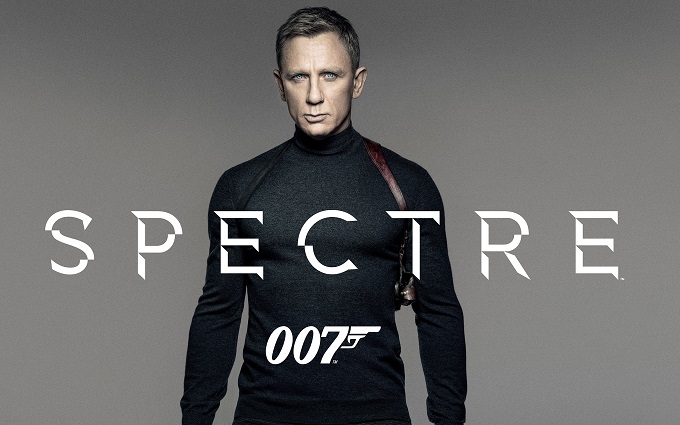
The Plot
A cryptic message from Bond’s Past sends him on a trail to uncover a sinister organisation. While M (Ralph Fiennes) battles political porches to keep the secret service alive, Bond peels back the layers of deceit to reveal the terrible truth behind SPECTRE
The Good
Director Sam Mendes returns to the Bond franchise after the dazzling success of 2013’s Skyfall in spectacularly lavish fashion. In an opening sequence that begins with an expertly executed tracking shot following Bond through the streets and rooftops of New Mexico as he dips in and out of a Day of the Dead parade, it’s clear that Mendes is not dropping the winning formula of action mixed with beautiful cinematography that won fans over last time round.
Craig’s Bond as always, is a treat to watch from beginning to end as he brings his usual quiet charm to the role. With Ralph Fiennes, Naomie Harris, Ben Wishaw and Rory Kinnear returning as bonds faithful allies, the cast list is already something to behold. Add in Christoph Waltz as the villain however, and the formula becomes explosive. Waltz, like Craig is cool calm and collected, without the humour of Skyfall’s Silva (Javier Bardem), a characteristic which could have held too many similarities with his career making role in Inglourious Basterds. He’s dropped into the story earlier than Silva was in Skyfall and remains a strong presence throughout.
And of course, a Bond film is incomplete without its female sidekick of which Spectre gives us three. There’s the aforementioned Harris who returns as Moneypenny, as well as Monica Bellucci who appears briefly. But it’s Lea Seydoux who is arguably the most important character of the three. Seydoux brings about her an air of equality when it comes to matching Bond’s skill in the arts of self defence in a thankfully pivotal role as Madeleine Swan.
The Bad
All this talent put together and yet the storyline for Spectre disappointingly comes up short. Having only recently reclaimed the rights to the titular terrorist organisation whose rich history in the Bond franchise is known to any self respecting fan, their return feels much less triumphant than it should be. While the script does ambitiously try to link everything from Craig’s tenure together, connecting the events of the past three films with just a few lines of exposition seems heavy handed and even a little necessary. Perhaps an all out origin story would have better served the return of Bond’s most iconic adversaries. Though the film’s closing stages do set the stage for future adventures and the reintroduction of even more familiar characters, their new backstories feel hastily concocted and clumsy.
While Waltz’s performance is as always a treat, his mysterious Franz Oberhauser feels criminally underused. Though his presence is consistent, his onscreen presence leaves much to be desired. Considering the lengthy 2 and a half hour runtime, its disappointing to see Oberhauser spend so much time hiding in the shadows. Also, while the length is indeed long, Spectre feels like it could have easily stripped away a good twenty minutes or so and left rather unscathed.
The Ugly Truth
Spectre is a worthy enough follow up to Skyfall if not quite up to its standards. An incredible cast and beautiful cinematography certainly keep things interesting, but for the return of the titular criminal organisation, it feels a little unfulfilled. Especially with such a seasoned villainous actor ending up a tad unused in order to create a sense of growing threat.
Review by Johnny Ellis
Pan Review
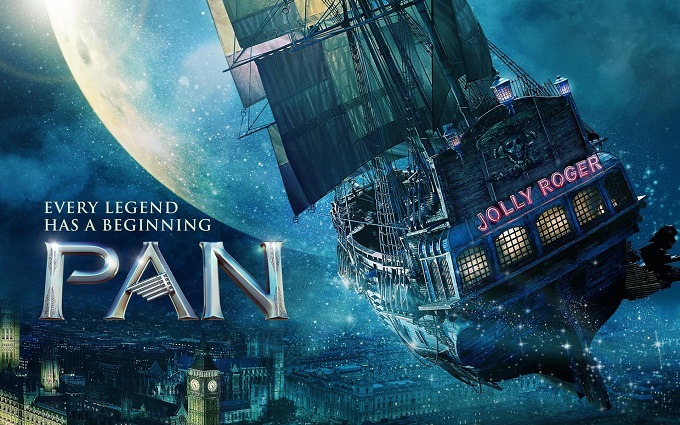
The Plot
One night a 12-year-old orphan Peter is spirited away from blitz ravaged 1940s London to the magical world of Neverland. While searching for his lost mother he befriends a young James T. Hook and faces off against the dread Pirate Blackbeard. Finding fun and dangers, he ultimately discovers his destiny to become the hero who will be forever known as Peter Pan.
The Good
As a prequel to the overly familiar J.M. Barrie tales of Neverland Pan at least has the distinction of exploring some fresh ground. Despite numerous screen versions and reimagining’s of Peter Pan this film promises to be an original adventure, reintroducing a whole host of beloved timeless characters.
Director Joe Wright has an accomplished CV full of costume rich period dramas, so it was always a safe bet that the world of Neverland would be intricately well dressed. Combined with a generous special effects budget, Neverland is full of flying pirate ships and beautiful fantasy locations. It’s as colourful, camp and grandiose a vision of J.M. Barrie’s creations as has ever been realised on screen before.
Landing Hugh Jackman as the villainous Captain Blackbeard is a major coup for the film. Jackman is likeable menacing and delightfully dastardly as the shamelessly showboating pirate villain determined to live forever at any price. He’s a neatly ready-made substitute for the not yet nasty Hook.
The Bad
While Pan has a flamboyant colourful style that will distract and mostly entertain young audiences, older audiences may find some of the creative choices a little more puzzling or troubling. Having the pirates of Neverland happily singing Nirvana grunge anthem Smells Like Teen Spirit is the most obvious example. It’s a jarring and inexplicable mix of pop cultures that is certain to strongly divide opinions. It’s either wonderfully whimsical or laughably silly.
The film had already attracted vocal criticism for casting Rooney Mara as Neverland’s native princess Tiger Lilly. Though Mara’s pale face may be in sharp contrast to the typically Native American depiction of the character, she remains an excellent actress and does well in the role in spite of this issue. Director Joe Wright has been quick to defend the decision anyway by insisting his Neverland and its inhabitants are more globalised and fantastical than heavy handed tribal stereotypes.
Playing Barrie’s most iconic creations Levi Miller as the young Peter and Garrett Hedlund as James T. Hook meet with mixed success at best.
British audiences will find newcomer Miller’s overly cockney orphan particularly cringe worthy in places. Likewise Garrett Hedlund deliver his own confounding choice of accent for Hook, sounding something like a cross between a 1940s used car salesman and Heath Ledger’s Joker. It’s such a distracting vocal performance that it manages to largely negate the charm of Garrett’s handsome good looks and a script generously trying to making him an action hero.
The film optimistically saves the origin story of ’Captain Hook’ for potential sequels, unfortunately leaving audiences feeling short changed by a prequel that still feels only half told. Though the creative team behind Pan have ambitious plans to stretch things out into a lucrative trilogy, it feels unnecessary and perhaps ill advised. It may prove a mistake to save the most interesting parts of this newly invented backstory for a second or third film that may never even become a reality.
The Ugly Truth
Pan is a colourful fantasy adventure that will likely keep its target audience of younger children mostly entertained. Grownups by turn will at least be able to enjoy watching Hugh Jackman shamelessly ham things up. If the film does prove to be a box office success, in truth the potential sequels may finally offer audiences a more interesting chapter in the back story of Hook and Pan.
Review by Russell Nelson
Suffragette Review
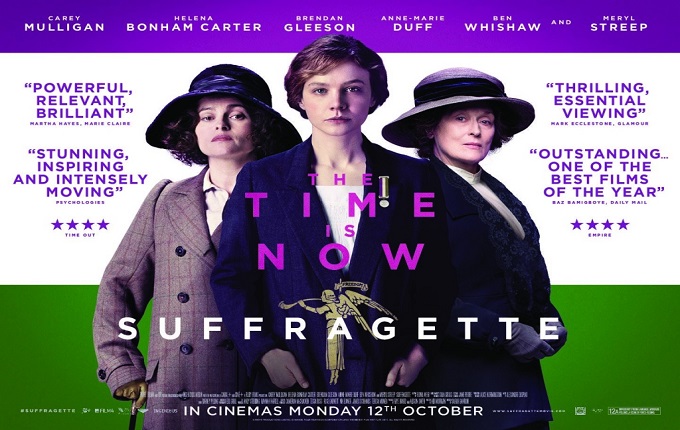
The Plot
Carey Mulligan leads an incredible cast in this look into the Suffragette movement for women’s rights in early 20th century London.
The Good
It’s both incredible and yet still unsurprising to think that Suffragette is really the first film which covers such an important topic. With such an impressive cast behind it, the story is undoubtedly in safe hands.
Carey Mulligan makes for an engrossing central character as Maude Williams, a working wife who is thrust into the middle of a political and social protest that soon begins to hurt not only her life, but that of her family’s. The secret to Mulligan’s success is largely part to her own feeling of unimportance which writer Abi Morgan’s script pushes into the subconscious with great effect.
Though the film centres on Mulligan’s performance, in a big way she could just have easily been a sidelined character to let the film focus more on Meryl Streep’s Emmeline Pankhurst. Instead Streep is rather smartly underused, appearing in only one scene like some sort of suffragette rockstar. The remainder of the supporting cast members are fortunately given more to do, with Natalie Press’ Emily Davison being a particular highlight. That said however, director Sarah Gavron manages to use her cast to their full potential without making anyone seem more or less important than the other.
Though it doesn’t exactly cover the entire timeline of its subject matter (difficult considering equality is still problematic to this day) Morgan’s script tackles it with great respect as she picks out moments both small and large to highlight the struggles of the era. And the story certainly isn’t afraid to tackle the grittiest details of the suffering its protagonists went through, with one scene involving a prison force feeding which is particularly hard to watch yet still is important to see that these horrific ways in which suffragettes were treated should not and will not be forgotten.
The Bad
Though the underuse of Meryl Streep is a smart move, her appearance still slightly jars. Considering the amount of coverage she’s been getting in the advertising for the film, it’s still somewhat disappointing to have her appear in one brief, albeit important, scene.
Also, though there are no problems thematically, Suffragette eventually ends up feeling like a by the books historical drama. Perhaps due to its lateness, a film about the Suffragette movement was always going to become much bigger in the audiences imagination than in the finished product. Or perhaps it’s due to the level of importance that this film holds.
The Ugly Truth
Suffragette is a well written historical drama about a subject that is still a problem to this day. Mulligan’s performance is certainly an interesting way in which to present the story, however something still feels amiss…